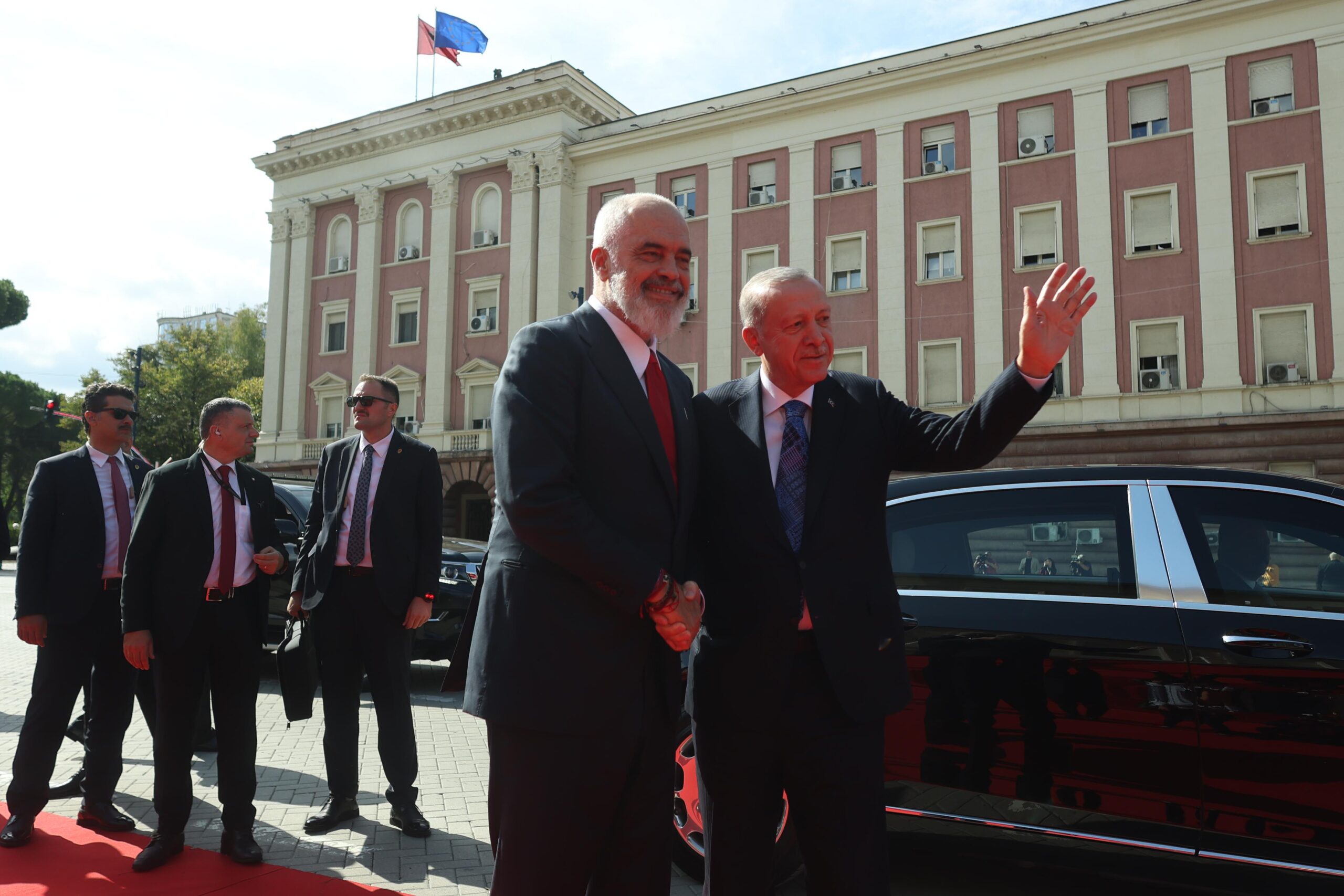Turkish President Erdoğan returns to Tirana after two-years for key visit

Photo: Edi Rama and Recep Tayyip Erdoğan
After two years, Turkish President Recep Tayyip Erdoğan made an important visit to Tirana, where he was warmly welcomed by Albanian President Bajram Begaj and Prime Minister Edi Rama. The visit, though brief, was important as the two countries continue to deepen their longstanding ties, both politically and economically. One of the key events during this visit was the inauguration of the newly constructed Namazgja Mosque, a monumental project funded by the Turkish Muslim community. The mosque is expected to serve as a symbol of the deep cultural and religious connections between Turkey and Albania.
Celebrating 100 years of diplomatic relations
In their discussions, Erdoğan and Rama reflected on a century of diplomatic relations between Albania and Turkey. This milestone was celebrated last year, and both leaders expressed their commitment to maintaining and enhancing this partnership. The Turkish president emphasized that the friendly relations between the two nations extend far beyond just diplomacy, being rooted in deep historical and cultural ties. Erdoğan also highlighted that these connections were formalized into a strategic partnership in 2021, a move that laid the groundwork for even closer cooperation in the years to come.
The two leaders confirmed their shared ambition of increasing the volume of trade exchanges between their countries to reach 2 billion euros, a target they consider feasible given the potential for economic collaboration. This trade goal was a central theme in their discussions, with both sides agreeing that current trade levels do not fully reflect the potential that exists between Albania and Turkey.
Erdoğan’s key remarks
During his address, President Erdoğan focused on several key aspects of the bilateral relationship, highlighting its depth and potential for growth:
- Historical Bonds: Erdoğan reiterated that Turkey’s ties with Albania are not merely diplomatic but are reinforced by shared history and cultural closeness. He stressed the importance of these relations in building a strategic partnership.
- Economic Cooperation: The Turkish president outlined his vision for increasing trade to 2 billion euros, noting that efforts are already underway to achieve this goal. He also mentioned that their discussions touched on diversifying investment sectors, focusing on innovative industries that could provide mutual advantages under current global conditions.
- New Agreements: Three significant agreements were signed during Erdoğan’s visit:
- A declaration of intent on cooperation in state-supported agricultural insurance between Albania’s Ministry of Agriculture and Turkey’s Ministry of Agriculture and Forestry.
- A protocol between Albania’s Ministry of Education and Sports and Turkey’s Higher Education Council to open branches and academic programs of Istanbul Technical University in Albania.
- A memorandum of understanding for cooperation between Albania’s Media and Information Agency and Turkey’s Directorate of Communications, focusing on public relations and communication strategies.
Erdoğan emphasized the strategic nature of these agreements, highlighting that they serve as another step in strengthening the long-term cooperation between the two nations.
Rama’s reflections on economic relations
Prime Minister Edi Rama shared his enthusiasm for the growing economic relationship between Albania and Turkey. He acknowledged that the level of trade between the two countries is still far from reaching its true potential but expressed confidence that the 2 billion euro target is achievable. Rama also mentioned that this figure would act as a stepping stone for further development in bilateral trade relations.
Rama also celebrated the increasing number of Turkish tourists visiting Albania, noting an 85% rise in Turkish tourism during the first eight months of the year. This is a significant indicator of the growing interest Turkish citizens have in Albania as a travel destination, which aligns with the government’s aim to further promote Albania as a tourist hub. Rama highlighted the expertise Turkey has developed in the tourism industry and expressed Albania’s eagerness to attract more direct Turkish investments in this sector. He referred to Turkey’s transformation into a major tourism destination, emphasizing how Albania could benefit from Turkey’s knowledge and experience.
Inauguration of the Namazgja Mosque
One of the most symbolic moments of Erdoğan’s visit was the inauguration of the Namazgja Mosque in Tirana, a project fully financed by Turkey’s Presidency of Religious Affairs. The mosque, now the largest in Albania, is a testament to the close cultural and religious ties between the two nations. However, the event was not without controversy, as the leader of Albania’s Muslim Community, Bujar Spahiu, was notably absent. Reports suggest that Turkey has been pressuring for Spahiu’s removal, citing alleged ties to the Gülenist movement (FETO), although no concrete evidence has been made public to support this claim.
The new mosque will be managed by a joint foundation between the religious communities of both countries, as announced by Prime Minister Rama during the inauguration. The decision reflects the continued influence Turkey has on religious matters in Albania and symbolizes the enduring Turkish-Albanian cultural collaboration.
Strategic high-level cooperation meeting
Another critical part of Erdoğan’s visit was the second meeting of the High-Level Cooperation Council between Albania and Turkey, held in Tirana. The council serves as a platform to discuss and coordinate efforts on strengthening bilateral relations. During this meeting, both leaders reiterated their commitment to enhancing the strategic nature of their cooperation. They reviewed the implementation of agreements signed over the past decade and explored new opportunities to deepen their partnership.
Looking forward
After concluding his visit to Tirana, President Erdoğan flew to Belgrade, where he is scheduled to meet Serbian President Aleksandar Vučić. This follows Turkey’s ongoing efforts to maintain and strengthen its diplomatic presence in the Balkans, a region of strategic importance to Turkey.


